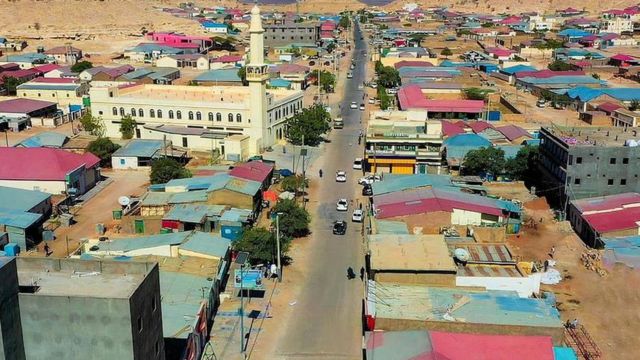Somaliland, the self-declared independent region in northern Somalia, has accused Ethiopia of fueling the conflict in Las Anod, the administrative capital of Sool region.
On 9 March, the Somaliland Council of Ministers, in a communiqué, called on allied troops, including those of the Somali region of Ethiopia, to withdraw from Las Anod.
The following day, leaders of Ethiopia’s Somali region released a statement categorically denying the allegation and called for Somaliland authorities to refrain from statements that could “alienate the people of both regions.”
Somaliland, which unilaterally declared its independence in 1991 but is not internationally recognized, claims Las Anod as its own despite opposition from the governments of Somalia, the Puntland region, and local elders who want to form an independent state within Somalia.
Failed Mediation
This accusation comes on the heels of mediation efforts by the Ethiopian government to end the conflict.
Ethiopian mediators had earlier met with the representatives of Sool, Sanaaag, and Cayn as well as Somaliland authorities. Somaliland’s refusal to withdraw its troops to Oog was the sticking point in the negotiations.
In response, the leaders of Ethiopia’s Somali region urged the Somaliland administration to refrain from making statements that could drive a wedge between these two fraternal societies.
Somaliland had previously portrayed itself as a “buffer zone” for Ethiopia and tried to sell its activities in Las Anod as fighting al-Shabaab terrorists.
Meanwhile, the government of Ethiopia has sent troops to Somalia to participate in a counter-terrorism operation. This move by Ethiopia hasn’t been received well by Somaliland’s leaders, who view it as meddling that risks souring their political relations.
Compounding Crises
The situation in Somaliland is further compounded by a humanitarian crisis that is unfolding in Ethiopia, as thousands of people fleeing the fighting in Somaliland have taken refuge in a remote area already suffering from severe drought.
The UN and Ethiopian refugee agencies estimate that 98,000 people have arrived in three districts bordering Somaliland since 6 February. Shelter, food, water, and medical aid are the pressing needs for these refugees, who are mainly women and children.
The refugees from Las Anod, who have reportedly been welcome by locals, express a desire to return home and are calling for solutions to the conflict in Somaliland.1
Root Causes
Since unilaterally declaring its independence in 1991, Somaliland has enjoyed relative stability until recently when rising political tensions triggered hostilities between Somaliland forces and militias from the neighboring semi-autonomous Somali region of Puntland.2
The conflict is rooted in a territorial dispute between Somaliland and Puntland, with the Dhulbahante clan inhabiting the contested regions of Sool, Sanaag, and Buuhoodle.
The Dhulbahante clan, a part of the larger Harti clan family which is a majority in Puntland, also claims Las Anod, the capital of Sool region, as its administrative center. In contrast, Somaliland is largely inhabited by the influential Isaaq clan which is a minority in the contested areas.
Before 2007, when Somaliland seized Las Anod, it was administered by Puntland.
Somaliland, which has long sought external recognition, has benefited from increasing international engagement in recent years.3 This has emboldened the de facto state to pursue aggressive measures to silence self-determination demands of the residents of the contested region.
A more immediate spark of the violence, the assassination of a local opposition politician, Abdifatah Abdullahi Abdi, by unknown assailants on 26 December 2022 led to anti-government protests across the city.
Independence Desire
On 6 February, Dhulbahante elders in Sool announced their desire for independence from both Somaliland and Puntland and to form their own federal state under Somalia, named SSC-Khaatumo.
Just before the declaration was released, Somaliland forces reportedly attacked Las Anod, indiscriminately shelling civilian infrastructure while forces loyal to the locals fought back.
The recent flare up in violence has reportedly led to at least 82 deaths and 400 injuries.
This latest round of conflict in Las Anod has elicited global condemnation and sparked concerns over the possibility of a regional conflagration.
Somaliland’s claim over the Sool region is reportedly motivated by a need to establish its claim to statehood, which is based on colonial boundaries.4 Puntland’s claim, on the other hand, is driven by its clan ties with the residents of the contested territories.
Somaliland has blamed the Somali government and Puntland of attempting to destabilize the breakaway region by supporting the local militants.
Perilous Stalemate
Las Anod is currently in a perilous stalemate, with Somaliland refusing to budge on the withdrawal of its troops from outside the city, and the Dhulbahante traditional leaders unwilling to negotiate unless troops withdraw to Oog.
The involvement of regional actors, which is driven by their own strategic interests, complicates efforts to find a peaceful resolution.
Djibouti is allegedly involved in the fighting, though it has denied claims that it’s supplying Somaliland’s government with weapons.
Ethiopia, on the other hand, is accused of tacitly supporting Puntland and the local rebels. Ethiopia’s intervention in the conflict could be seen as an attempt to assert its influence in the region.
The accusation by Somaliland that Ethiopia is fueling the conflict in Las Anod is a worrying development that could further strain their partnership.
The article first appeared on Ethiopia Insight

